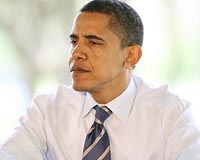| . |  |
. |
Seoul (AFP) Dec 6, 2010 South Korea's military began a major live-fire exercise Monday amid high tensions on the divided peninsula following North Korea's deadly bombardment of a border island last month. The Joint Chiefs of Staff (JCS) said the five-day series of drills would take place in 29 locations off South Korea, despite the North's claims that it could trigger war. It was unclear whether one of the firing drills -- near the flashpoint disputed Yellow Sea border -- had begun as earlier announced. YTN television said around midday that firing had not yet started off Daecheong island. A JCS spokesman said he had no confirmation of the report. In a shock bombardment of Yeonpyeong island on November 23, the North killed two civilians and two marines and destroyed 29 homes, sending regional tensions soaring. The North maintained it was retaliating for a South Korean artillery drill which had lobbed some shells into waters it claims as its territory. Yeonpyeong has been excluded from this week's drills, which military officials said would involve the army, navy and air force. Pyongyang Sunday described the exercise as an attempt to trigger a war. "The frantic provocations on the part of the puppet group (Seoul government) are rapidly driving the situation on the Korean peninsula to an uncontrollable extreme phase," the North's official news agency said. "I don't dwell on North Korea's response as it does not deserve even a little consideration," said the South's new defence minister Kim Kwan-Jin, who last week vowed to hit back with air strikes against any new attack. The South's artillery fired back on November 23 at the North's artillery units but its response was widely seen as weak and ineffective. More troops and weaponry are being sent to five frontline islands "so that we will be able to respond resolutely to any provocations", Prime Minister Kim Hwang-Sik said Monday. He said the government would spend 30 billion won (26 million dollars) helping Yeonpyeong residents, most of whom fled to the mainland after the shelling. "We will make the utmost efforts to ensure the villagers can go back home with no fear and return to work as normal," the prime minister said, promising to rebuild shattered homes and provide incentives to encourage people to return home and encourage settlement by newcomers. South Korea and the United States last week staged their biggest-ever naval exercise off the peninsula as a warning to the North. The largest ever US-Japan war games got under way separately Friday. The North's bombardment, the first of civilian areas in the South since the war, came less than two weeks after it put a new and apparently operational uranium enrichment plant on show to US visitors. The North says the plant is for peaceful purposes. But US experts and officials say it could easily be reconfigured to make weapons-grade uranium to supplement an existing plutonium stockpile. Analysts say the display of nuclear prowess and the bombardment are designed to burnish the military credentials of Kim Jong-Un, son of leader Kim Jong-Il and his heir apparent. They say the North also appears to be pressuring the United States and other parties to restart nuclear negotiations and aid. US Secretary of State Hillary Clinton will hold talks Monday with foreign ministers Kim Sung-Hwan of South Korea and Japan's Seiji Maehara to forge a strategy for dealing with the North. All three nations have responded coolly to a proposal by China, the North's sole major ally, for an emergency meeting of envoys to six-nation nuclear disarmament talks, which are currently stalled. In addition to the Yeonpyeong attack, Maehara has said they will discuss North Korea's uranium enrichment and other nuclear developments. China has not publicly condemned its ally for the shelling attack, but is pushing to restart the six-party talks it has hosted since 2003. These also group the two Koreas, the United States, Russia and Japan but have been stalled for the past two years. Washington, Seoul and Tokyo oppose a return to the negotiations until Pyongyang shows it is serious about nuclear disarmament. Australian Foreign Minister Kevin Rudd praised South Korea's "great restraint" during the crisis. Rudd said the South's live-fire exercises had been staged for decades but had faced an "abnormal" response from the North this year.
Share This Article With Planet Earth
Related Links Learn about nuclear weapons doctrine and defense at SpaceWar.com Learn about missile defense at SpaceWar.com All about missiles at SpaceWar.com Learn about the Superpowers of the 21st Century at SpaceWar.com
 Obama: US-S.Korean alliance 'stronger than ever'
Obama: US-S.Korean alliance 'stronger than ever'Washington (AFP) Dec 4, 2010 The US-South Korean alliance is "stronger than ever," President Barack Obama said Saturday in the wake a deadly North Korean assault on its southern neighbor. "At a time in which there are increasing tensions on the Korean peninsula following the North's unprovoked attack on the South Korean people, today we are showing that the defense alliance and partnership of the United States and South ... read more |
|
| The content herein, unless otherwise known to be public domain, are Copyright 1995-2010 - SpaceDaily. AFP and UPI Wire Stories are copyright Agence France-Presse and United Press International. ESA Portal Reports are copyright European Space Agency. All NASA sourced material is public domain. Additional copyrights may apply in whole or part to other bona fide parties. Advertising does not imply endorsement,agreement or approval of any opinions, statements or information provided by SpaceDaily on any Web page published or hosted by SpaceDaily. Privacy Statement |